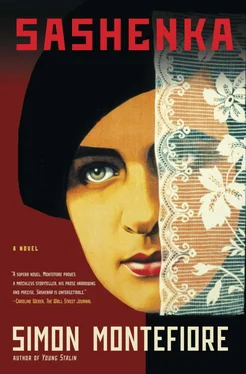“He helped me,” Katinka told her, “but there were some things he didn’t want me to discover.”
“He so wanted you to find Sashenka’s children again,” said Mariko, “but he’d devoted his life to the Soviet Union and the Party. He needed to help you without undermining his beliefs. And he never wanted anyone to know the terrible thing he had done. My father saw much tragedy in his life but, you know, I think Sashenka was always in the back of his mind, in his dreams. She and all her family. He must have seen them every day in this apartment.”
“But we still don’t know what happened to her,” said Katinka with a touch of bitterness. “The file was missing. Only your father knew, and he’s taken the secret to his grave.”
There was nothing else to say. Mariko stood up, collecting the plates and the cups, piling them in the sink.
“I’m sorry for your loss,” said Roza.
Mariko dried her hands on a towel. “And I’m s—” but she stopped herself sharply. “Thank you for coming,” she said at last.
A few minutes later, Katinka and Roza walked down the stone steps to the street where Pasha’s Bentley waited. A chauffeur opened the door. History is so messy, so unsatisfactory, Katinka thought, remembering her father’s sorrowful words earlier that morning. She too hated the way history toyed with people.
“Katinka!” She looked up. “Katinka!” Mariko was calling to her from the first-floor landing.
The front door was still open and Katinka turned and ran back up the steps.
“Take this.” Mariko thrust a yellow envelope into Katinka’s hands. “My father made me promise to destroy it. But I want you to have it. Go on, Katinka, it’s your story as well as ours. Yours and Roza’s.”
“I need your help, Maxy, one last time,” Katinka told him on the telephone once she and Roza were back at the Getman mansion.
“It’s lovely to hear your voice,” answered Maxy. “I missed you. And I’ve got something to show you, out in the countryside. What better place to talk and think. Can I pick you up?”
Half an hour later, Katinka heard the welcome roar of his motorbike. Feeling excited and suddenly pleased to see him, she ran outside, and soon they were racing along roads newly covered with sleek black asphalt, paid for by the oligarchs and ministers who owned dachas in that region, no longer ramshackle wooden villas but gigantic chalets and mock-Tudor palaces, guarded by watchtowers and high walls. After a while Maxy turned the bike off the road and onto a rougher lane into the forest.
The sunlight shone through the leaves of birch and pine and linden. Katinka enjoyed the bumpiness of the ride and the clarity of the air after all the hours she had spent recently on planes and in dusty archives. Finally they stopped in a clearing near an old-fashioned wooden villa. Katinka pulled off her helmet and found herself among raspberry canes and blackberry bushes.
“What a beautiful place,” she said, shaking back her hair.
“I’ve brought some Borodinsky bread and cheese to nibble while we talk, and some juice.”
“I never thought you’d be so domesticated,” she said. “I’m impressed.”
Maxy looked embarrassed but pleased. He put the food on the grass and sat down. “Well? Who’s first?”
“You!” they both said at the same time—and then they laughed.
“No,” Maxy said, “I want to hear your news first, and how I can help you. But I just wondered…what was it like being home?”
“Fine,” she answered. She sat down on the grass, enjoying the way the dappled beams made puzzle shapes on Maxy’s face. The sun heated the pine resin so that it sweetened the air.
He broke up the black bread, cut a slice of cheese and offered her both.
“How’s your boyfriend down there?”
“Oh, I see what you meant. About being home.”
“No, no, I didn’t mean it like that. I was just…”
“Curious? He’s the same as he was before, but I’m not sure how long I’ll stay down there. Meeting Roza and Pasha, researching Sashenka”—she was surprised at how nervously he seemed to be listening to her words—“has changed things a bit, changed me in fact. So I’m thinking of staying in Moscow this summer. I might get on with my research or, if you’re kind to me, I might even help you out a bit at the foundation…”
“That’s great!” Maxy smiled so sunnily at her that Katinka wanted to laugh. But she discovered that his pleasure delighted her, though she resolved not to show it. He was too pleased with himself as it was.
“Anyway,” he said, changing tone, returning to business, “what did Satinov’s daughter give you?”
Katinka pulled the envelope out of her jacket, undid the string at the top and drew out an old file from the archives. “I’ve only glanced at it. It’s the missing file.”
Top Secret.
To: J. V. Stalin; L. P. Beria
Report of the Commission of Inquiry on behalf of Central Committee—Comrades Merkulov, Malenkov, Shkiryatov—on the official misconduct concerning the Highest Degree of Punishment of Object 83 at Special Object 110 on 21 January 1940. Report filed 12 March 1940.
Katinka noticed the doodlings—circles, rhomboids and crescents in green crayon—around the heading, and gasped: “It’s Stalin’s own copy.”
“Right,” said Maxy.
“How did Satinov get it?”
“That’s easy. After Stalin’s death in fifty-three, each leader wanted to save his own skin so they all rifled through the archives to remove any especially incriminating documents. Usually they burned them. But Satinov kept this.” He studied the document carefully, absentmindedly putting a cigarette in his mouth, striking a match but forgetting to light it.
“Now let’s interpret this. The Highest Degree of Punishment is execution with a single bullet to the back of the neck. The Special Object One Hundred Ten is Beria’s special prison, Sukhanovka, the former St. Catherine’s Nunnery at Vidnoe, where Sashenka and Vanya were tried and executed. It was so secret that prisoners there were known by numbers, not by their names, so Object Eighty-three is—”
“Sashenka,” interrupted Katinka. “It was her number on the death list.” She leaned over and started to read. “First they interviewed Golechev, the prison commandant…”
Commission: Comrade Commandant Golechev, you were responsible for the completion of the Highest Degree of Punishment on sentenced prisoners on 21 January 1940. The Highest Degree was to be witnessed on behalf of the Central Committee by Comrade Hercules Satinov. Why did you begin early and in such a disorderly and un-Bolshevik way?
Golechev: The Highest Degrees were carried out in the professional manner expected of an NKVD officer.
Commission: I warn you, Comrade Golechev, this is a serious offense. Your conduct helped our enemies. Were you working for the enemy? You may well face the Highest Degree yourself.
Golechev: I confess before the Central Committee to serious and foolish mistakes. It was my birthday. We started drinking early, at lunchtime, and drinking helps when there’s a Vishka to conduct. Cognac, champagne, wine, vodka. At midnight it was time to bring the prisoners down, but Comrade Satinov was late and we couldn’t start without him.
Commission: Comrade Satinov, why were you, the witness, so late?
Satinov: I was taken ill, seriously ill, but I reported my illness to the commandant and arrived at Sukhanovka as soon as I could.
Commission: Comrade Satinov, you knew some of the convicted prisoners, especially Sashenka Zeitlin-Palitsyn. Were you suffering from a neurasthenic crisis caused by bourgeois sentimentality?
Читать дальше












